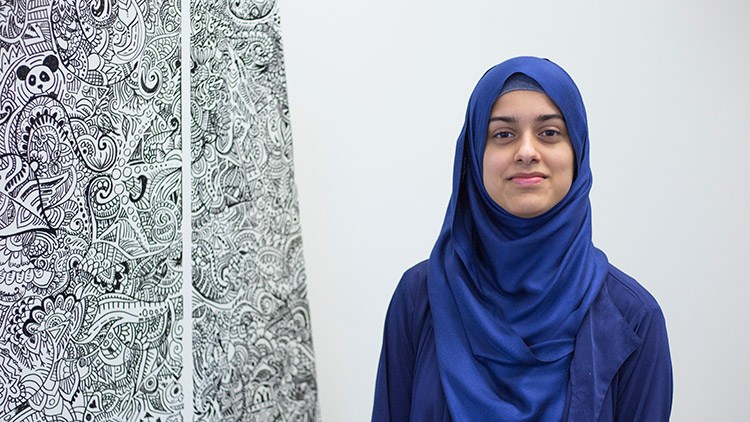
The artist’s signature, capped by a swirling flower, is as delicate and as intricate as is her mural in IIT Tower—a 3-foot by 7-foot outline of a tall building filled with a hand-drawn landscape of black and white leaves, buds, curlicues, and an occasional peeking panda. Fatima Azfar (CS 3rd year) says that while her personal sketchbooks brim with page upon page of increasingly elaborate visual realms of her imagination, she never thought that she could parlay her talent into a paid profession—that is, until she had slain the dragon.
Azfar participated in a new Interprofessional Projects (IPRO) Program course called Dragon Slayer (Designing YOUR Future), offered at Illinois Tech for the first time this past spring. It is modeled after the late American mythologist Joseph Campbell’s iconic “hero’s journey” story, about an individual undertaking a life adventure, obtaining a victory over crisis, and then returning home transformed.
“We use a lot of the principles and methods we teach in the traditional design process to help students understand career options, think about what they can do in the future, and challenge some of their orthodoxies,” says IPRO Director Jeremy Alexis, who co-teaches the course with Annie Littrell Senior and Tracy Skala from the Office of Career Services. “We have some students, who, from the day they start primary school, are told they are going to become doctors or engineers. We don’t want to keep them from doing that, but we want to help them see that their options might be a little bit broader, and how amazing and wonderful their careers can be.”
Dragon Slayer has benefitted Azfar in several ways. Before enrolling in the IPRO she had been designing flyers and posters as a volunteer for ICNA Relief Chicago. The intimate environment of the course gave Alexis the chance to learn about Azfar’s creative efforts and he offered her the chance to design a mural for the relocated Idea Shop in IIT Tower.
“The idea was to create an art piece that would reflect the international diversity of Illinois Tech students and be an interesting attraction for new students,” she explains. “I never thought my doodles would work as a large-scale mural.”
Also, in her role as a peer career coach for Career Services, where she assists fellow students by reviewing resumes, LinkedIn profiles, and other documents, Azfar now better understands the process by which students can discover and manage their futures, by better understanding her own journey.
Students in the IPRO course spend a fair amount of time reflecting, whether through directed discussion or activities that lead them through the stages of the hero’s journey. One exercise gives students the chance to be a chief executive officer, a chief experience officer, and a chief technology officer to see which distinctively different role suits them better. Real-life leaders then visit with the students to answer their questions. In one of her exercises, Azfar and her IPRO team came up with the concept of “fun zones” within Career Services, such as a station where students can try their hands at making their own business cards, and is now working with Skala to further develop the idea.
“Not every student is going to benefit from this class or even need this type of class. But for students who may not exactly know what they’re going to do next—or who are perhaps so confident in what they are going to do next—that this is a good way for them to be more considerate about that choice,” says Alexis. “It can help them to realize that career paths are not linear anymore; the world is changing. In many ways there are a lot more opportunities, but there are also a lot more challenges. You see this in every discipline. Students have to be prepared for a much more agile and mobile way to attack their future careers.”